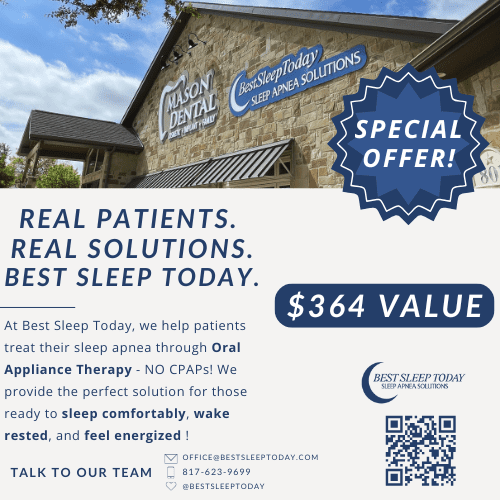In the realm of sleep disorders, sleep apnea is a significant player that affects over 20 million adults in the United States alone. Yet, despite the high prevalence, it remains vastly undiagnosed, leaving millions untreated. One of the primary reasons for this is the subtle nature of the symptoms which are commonly mistaken for regular snoring or nighttime habits. In this comprehensive guide, our team at Best Sleep Today in Grapevine, TX will walk you through the possible signs of sleep apnea and how identifying them can lead you to a better night’s rest – starting today.
Understanding Sleep Apnea
Before we look at the warning signs, it’s important to understand what sleep apnea is. The condition involves repeated interruptions in breathing – known as apneas – during sleep. These can last from a few second to minutes and can occur multiple times an hour, drastically reducing your body’s oxygen supply. There are three primary types of sleep apnea:
- Obstructive Sleep Apnea (OSA): This is the most common form and is caused by a relaxation of the throat muscles, obstructing the airway.
- Central Sleep Apnea (CSA): Here, the brain fails to send proper signals to the muscles controlling breathing.
- Complex Sleep Apnea Syndrome (treatment-emergent central sleep apnea): This is a combination of OSA and CSA elements, also referred to as mixed sleep apnea.
Signs of Sleep Apnea
The symptoms of sleep apnea can manifest in various ways. Some individuals may experience a combination of indicators, while others may have no idea there’s anything wrong. Here are some common signs to look out for:
- Loud and Persistent Snoring: While not everyone who snores has sleep apnea, it is a common warning sign, especially when paired with periods of silence and gasps for air.
- Choking or Gasping During Sleep: These disruptions can indicate that you’ve stopped breathing and that your body is briefly waking up to resume breathing.
- Daytime Sleepiness: Feeling overly exhausted during the day can be a result of interrupted sleep from nighttime apneas.
- Morning Headaches: Waking up with a headache can be a symptom of the oxygen deprivation that occurs with sleep apnea.
- Difficulty Concentrating: Cognitive impairments, including trouble focusing and memory problems, may be due to the poor quality of sleep associated with sleep apnea.
- Irritability or Depression: Sleep apnea can take a toll on your mental health, leading to mood swings, feelings of depression, or even full-blown depression.
Seeking a Diagnosis
If you find that you resonate with several of these symptoms, it’s crucial to seek a diagnosis. This often involves a sleep study, which can be done in a lab or even in the comfort of your own home. The study will monitor various bodily functions while you sleep to determine if you have sleep apnea, and which type it may be.
Treatment Options
The good news is that, once diagnosed, sleep apnea is generally treatable. Common treatment options from Best Sleep Today include:
- CPAP (Continuous Positive Airway Pressure) Machine: This device delivers a constant flow of air to keep your airway open during sleep.
- Oral Appliances: These can help keep your throat open, by bringing your jaw forward.
- Surgery: For severe cases of sleep apnea, surgery might be an option to clear obstructive passages.
- Lifestyle Changes: Sometimes, simple changes like losing weight, quitting smoking, or sleeping on your side instead of your back, can significantly improve symptoms.
The Path to Better Sleep
The first step towards achieving better sleep is being aware of the signs and seeking professional help from Best Sleep Today in Grapevine, TX if you suspect you may have sleep apnea. By doing so, you’re not only taking care of your quality of life but also reducing the associated risks of untreated sleep apnea, such as heart disease, high blood pressure, diabetes, and stroke. Remember, sleep apnea is a condition that requires medical diagnosis and management, and with proper treatment, a restful night’s sleep is well within reach.












